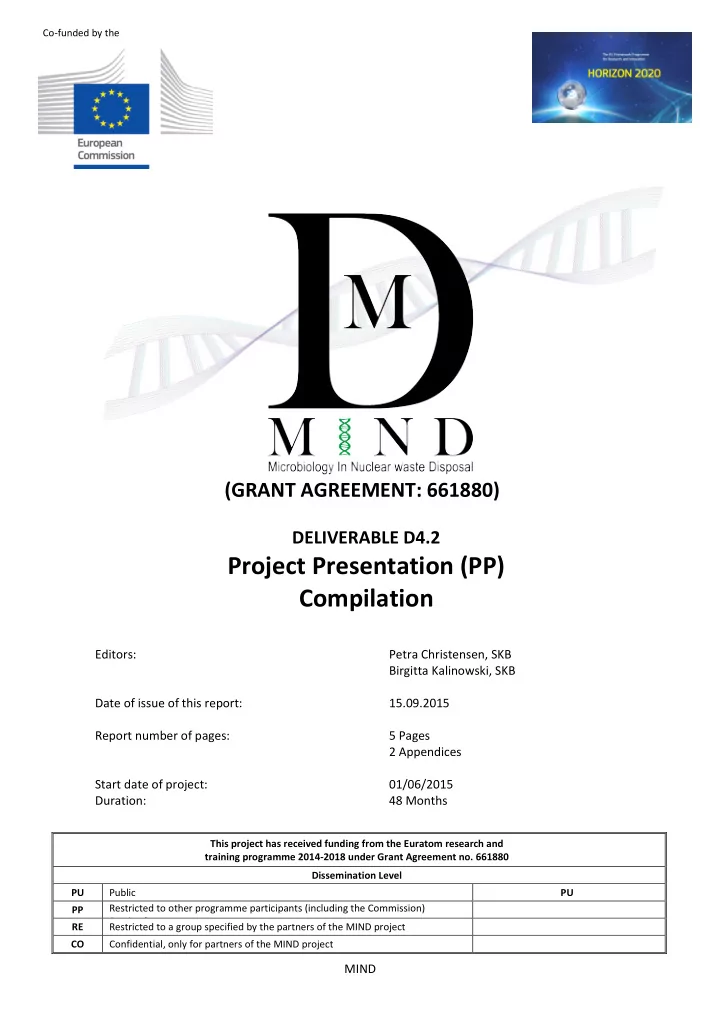

Co-funded by the (GRANT AGREEMENT: 661880) DELIVERABLE D4.2 Project Presentation (PP) Compilation Editors: Petra Christensen, SKB Birgitta Kalinowski, SKB Date of issue of this report: 15.09.2015 Report number of pages: 5 Pages 2 Appendices Start date of project: 01/06/2015 Duration: 48 Months This project has received funding from the Euratom research and training programme 2014-2018 under Grant Agreement no. 661880 Dissemination Level PU Public PU Restricted to other programme participants (including the Commission) PP Services) RE Restricted to a group specified by the partners of the MIND project CO Confidential, only for partners of the MIND project MIND
1 Project Information Website address: www.mind15.eu Project type: Collaborative project Project start date: 01/06/2015 Duration: 48 months Total cost: EUR 4 712 985 EC contribution: EUR 4 160 234,50 EC Project officer: Christophe Davies European Commission Directorate-General for Research Directorate Energy (Euratom) Unit J.2 – Fission CDMA01/061 Rue du Champ de Mars, 21 B-1049 Brussels Email: christophe.davies@ec.europa.eu Project Coordinator: Petra Christensen, Svensk Kärnbränslehantering Äspölaboratoriet Box 929, 572 29 Oskarshamn, Sweden Phone: +46 491 76 70 45 Email: petra.christensen@skb.se Technical Coordinator: Birgitta Kalinowski, Svensk Kärnbränslehantering Blekholmstorget 30, 101 24 Stockholm, Sweden Phone: +46 8 459 85 82 Email: birgitta.kalinowski@skb.se Partners (see Annex 1) Date of issue of this report: 2015-09-15
Contents 1 Project Information ......................................................................................................................... 1 2 Introduction and main aim of the project ....................................................................................... 1 3 Organizational structure .................................................................................................................. 2 3.1 Project Executive Committee .................................................................................................. 2 3.2 Implementers Review Board ................................................................................................... 2 3.3 Project Coordinator and Coordination team ........................................................................... 3 3.4 Work Package Leader .............................................................................................................. 3 3.5 Project Annual Meetings ......................................................................................................... 3 3.6 Work Plan and Implementation .............................................................................................. 3 3.7 Deliverables ............................................................................................................................. 4 3.8 Expected results ...................................................................................................................... 4 3.9 Dissemination channels ........................................................................................................... 5 Appendice 1. Partners ..................................................................................................................... 6 Appendice 2. Deliverables ............................................................................................................... 7
2 Introduction and main aim of the project By 2015, three Member States (Finland, Sweden, possibly also France) should have submitted an application for authorisation to build and operate an underground repository, in particular for high level and long-lived radioactive waste and spent fuel. The EU Implementing Geological Disposal of Radioactive Waste Technology Platform (IGD- TP) has developed the vision, “that by 2025, the first geological disposal facilities for spent fuel, high-level waste and other long-lived radioactive waste will be operating safely in Europe” (Vision 2025). The IGD -TP has developed a Strategic Research Agenda (SRA) that identifies and prioritises the main Research, Development and Demonstration (RD&D) issues that need a coordinated effort over the next years in order to reach the 2025 Vision. The MIND project is a multidisciplinary project addressing key technical issues that must be tackled to support the implementation of planned geological disposal projects for higher-level radioactive wastes across the EU. Our current understanding of the impact of microbial metabolism on the safety of geological repositories remains tenuous, even though microorganisms may have controlling influences on waste-form evolution in situ , multi-barrier integrity and ultimately radionuclide migration from the repository. The MIND project targets a number of “high urgency” and “high importance” topics identified in the most recent IGD -TP Strategic Research Agenda, focusing specifically on the influence of microbial processes on waste forms and their behaviour, and the technical feasibility and long-term performance of repository components. The project brings together, for the first time, 15 European groups from 8 countries working on the impact of microbial processes on safety cases for geological repositories across the EU, focusing on key questions posed by waste management organisations. The emphasis will be on quantifying specific measureable impacts of microbial activity on safety cases under repository-relevant conditions, thus altering the current view of microbes in repositories and leading to significant refinements of safety case models currently being implemented to evaluate the long-term evolution of radioactive waste repositories. The project is both unique and important, and will help the EU claim international leadership in the understanding of the impact of microbial processes on radioactive waste geological disposal, and indeed other technological areas pertinent to the exploitation of the subsurface. 1 The MIND-project has received fundin g from the European Union’s E uratom research and training program (Horizon2020) under grant agreement 661880.
3 Organizational structure Coordination Team (SKB) WP4 Implementers Project Project Review Board Executive Committee Management WP1 WP2 WP3 Figure 1. WP1: Improving the geological safety case knowledge of the behaviour of organic containing long- lived intermediate level wastes.WP2: Improving the safety case knowledge base about the influence of microbial processes on high level waste and spent fuel geological disposal. WP3: Integration, Communication and Dissemination.WP4: Project Management. 3.1 Project Executive Committee The Project Executive Committee (PEC) have one representative from each of the 15 partners and meet at appropriate intervals in conjunction with Project Annual Meetings at the request of the Chair or at any other time when necessary at the request of one of the Parties. The PEC provides technical guidance and is responsible for the management and financial control, through the Project Coordinator, who is supported by administrative personnel. The PEC has the ultimate responsibility for: all major decisions concerning the demonstration activities (within given time plans and budgets). SKB convenes the first Project Executive Committee meeting in Brussels on September 3 rd , 2015. 3.2 Implementers Review Board The PEC appoints the members of the Implementers Review Board given the task to advise the PEC in technical matters, mainly soundness and relevancy of the technical approach and assessment of the scientific and engineering standard of the work carried out and produced Deliverables. A list of representatives invited to the Implementers Review Board will be established at the first project PEC meeting in Brussels on September 3 rd , 2015. 2 The MIND-project has received fundin g from the European Union’s E uratom research and training program (Horizon2020) under grant agreement 661880.
Recommend
More recommend